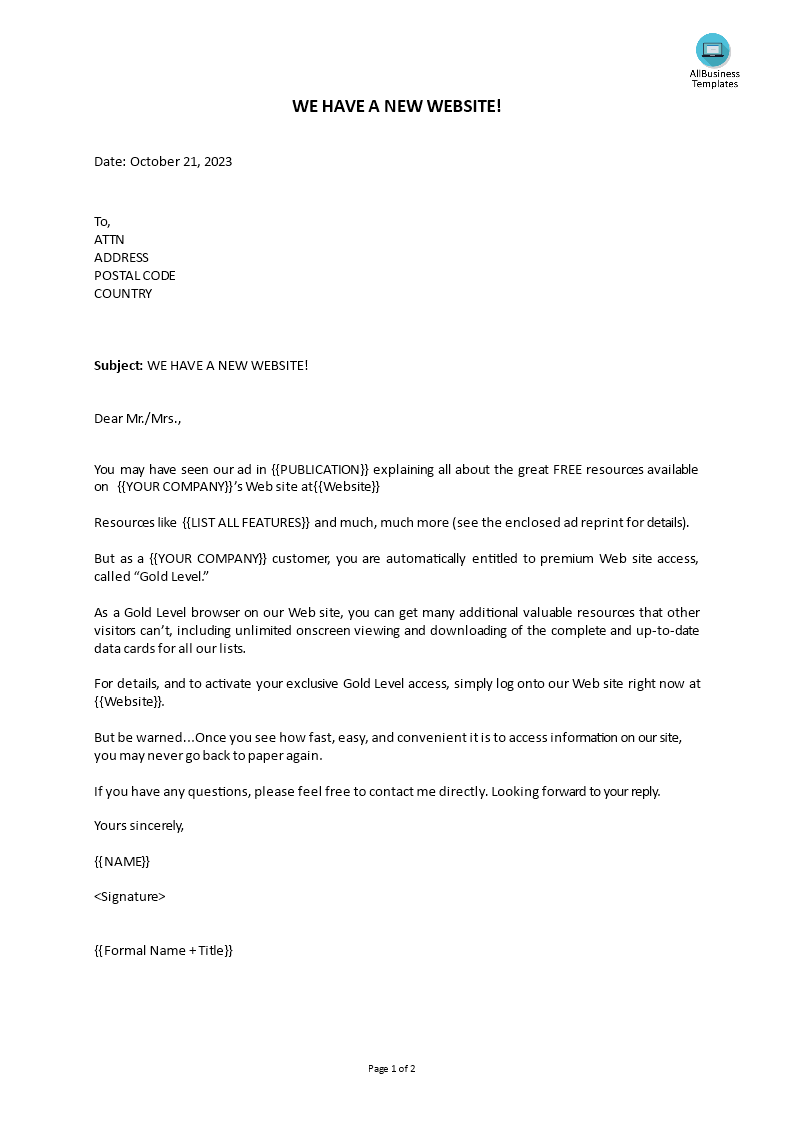PR New Website Notification
Save, fill-In The Blanks, Print, Done!

Download PR New Website Notification
Today: USD 1.49
Download It Now

Available premium file formats:
Microsoft Word (.docx)- This Document Has Been Certified by a Professional
- 100% customizable
- This is a digital download (24.69 kB)
- Language: English
- You will receive a link to download the file as soon as your payment goes through.
- We recommend downloading this file onto your computer.
How to write a PR Notification Visit our New Web Site!? When you launch a new website, how do you announce it? Our template is user-friendly and designed to make the process of notifying customers of a new website as easy as possible. It includes all the necessary elements you need to communicate the message clearly. We also provide a step-by-step guide to help you customize the letter to fit your unique circumstances. Download this Visit our New Web Site! template now!
A new website notification letter is a communication sent to individuals or relevant parties to inform them about the launch or creation of a new website. This type of letter is typically used in business or organizational contexts to announce a new online presence, whether it's a company website, an e-commerce platform, a blog, or any other type of web-based platform. The letter serves as a formal way to share the news and invite recipients to visit the website.
Here's what a New Website Notification Letter might include:
- Header: The letter should have a header with your company or organization's name and contact information.
- Salutation: Address the letter to the recipient or audience, such as "Dear Customers," "Dear Subscribers," or "Dear [Company Name] Team."
- Introduction: Begin the letter by stating the purpose, which is to inform the recipients about the new website.
- Website Information: Provide details about the new website, including its name, URL, and a brief description of its purpose, features, or content.
- Benefits: Highlight the benefits or advantages of the new website for the recipients. Explain why they should visit and how it can be valuable to them.
- Invitation: Encourage the recipients to explore the website. Use a persuasive call to action to motivate them to take a specific action, such as "Visit our website now" or "Register for an account."
- Contact Information: Include contact information for inquiries or assistance related to the website. This could be an email address, a phone number, or a link to a "Contact Us" page on the website.
- Appreciation: Express your appreciation for the recipients' continued support or interest in your organization or company.
- Closing: Conclude the letter with a polite closing, such as "Sincerely," and your name or the name of your organization.
- Signature: If the letter is from a specific individual within the organization, include their signature, otherwise, use the name and title of the sender.
- Additional Information: If there are any specific launch events, promotions, or special offers related to the new website, you can mention them in the letter.
- Attachments: If there are any attachments, such as user guides, brochures, or promotional materials, mention them in the letter.
Remember that the tone and content of the letter should be tailored to the specific audience you are addressing and the nature of your website. It's important to make the letter informative and engaging to encourage recipients to visit and explore the new website.
Download this professional PR New Website Notification sales template now!
Sneak preview:
DISCLAIMER
Nothing on this site shall be considered legal advice and no attorney-client relationship is established.
Leave a Reply. If you have any questions or remarks, feel free to post them below.
How to write a Press Release?
How to get your company public information and news out in a proper and intelligent way you want people to receive it? Check out our PR templates now!
Read moreRelated templates
Latest templates
Latest topics
- Excel Templates
Where do I find templates for Excel? How do I create a template in Excel? Check these editable and printable Excel Templates and download them directly! - GDPR Compliance Templates
What do you need to become GDPR compliant? Are you looking for useful GDPR document templates to make you compliant? All these compliance documents will be available to download instantly... - Google Docs Templates
How to create documents in Google Docs? We provide Google Docs compatible template and these are the reasons why it's useful to work with Google Docs... - IT Security Standards Kit
What are IT Security Standards? Check out our collection of this newly updated IT Security Kit Standard templates, including policies, controls, processes, checklists, procedures and other documents. - Letter Format
How to format a letter? Here is a brief overview of common letter formats and templates in USA and UK and get inspirited immediately!
cheese
